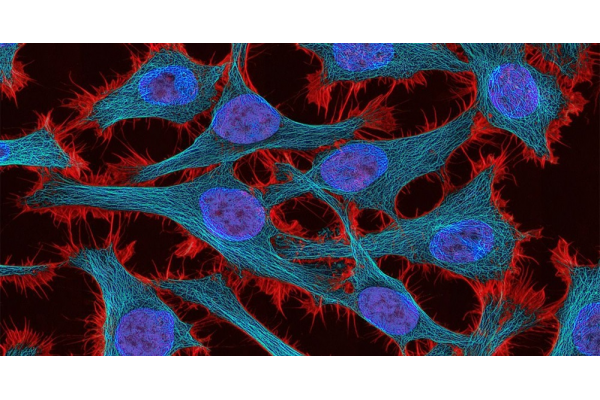AI Leverages Tumor Genetics to Predict Patient Response to Chemotherapy
January 25, 2024
Source: drugdu
 302
302

Understanding tumor responses to drugs becomes challenging due to the complex nature of DNA replication, a critical target for many cancer treatments. All cells, including cancer ones, depend on a sophisticated system for DNA replication during cell division. Most chemotherapies aim to disrupt this replication process in rapidly multiplying tumor cells. Given the diverse genetic mutations in tumors, predicting drug resistance remains a formidable challenge. Now, scientists have developed a machine learning algorithm capable of predicting when cancer will resist chemotherapy. This model was specifically tested on cervical cancer, accurately predicting responses to cisplatin, a widely used chemotherapy drug. It efficiently identified tumors likely to resist treatment and shed light on the molecular mechanisms driving this resistance.
Developed by the University of California San Diego School of Medicine (La Jolla, CA, USA; ), the algorithm assesses how various genetic mutations collectively impact a tumor's response to DNA replication-inhibiting drugs. The research centered around 718 genes typically analyzed in clinical genetic testing for cancer. These genes' mutations formed the basis for the machine learning model, trained using publicly available drug response data. This process led to the identification of 41 molecular complexes — clusters of interacting proteins — where genetic alterations affect drug effectiveness. The model's efficacy was particularly demonstrated in cervical cancer, where approximately 35% of tumors show resistance to treatment.
The algorithm successfully distinguished between tumors that were likely to respond to treatment, correlating with better patient outcomes, and those that were resistant. Importantly, the model also provided insights into its decision-making process by pinpointing the protein complexes driving resistance in cervical cancer. This interpretability feature of the model is crucial not only for its effectiveness but also in establishing reliable AI systems in medical applications.
"Clinicians were previously aware of a few individual mutations that are associated with treatment resistance, but these isolated mutations tended to lack significant predictive value. The reason is that a much larger number of mutations can shape a tumor's treatment response than previously appreciated," said Trey Ideker, PhD, professor in Department of Medicine at UC San Diego of Medicine. "Artificial intelligence bridges that gap in our understanding, enabling us to analyze a complex array of thousands of mutations at once."
"Unraveling an AI model's decision-making process is crucial, sometimes as important as the prediction itself," added Ideker. "Our model's transparency is one of its strengths, first because it builds trust in the model, and second because each of these molecular assemblies we’ve identified becomes a potential new target for chemotherapy. We’re optimistic that our model will have broad applications in not only enhancing current cancer treatment, but also in pioneering new ones."
Source:
By editorRead more on
- The first subject has been dosed in the Phase I clinical trial of Yuandong Bio’s EP-0210 monoclonal antibody injection. February 10, 2026
- Clinical trial of recombinant herpes zoster ZFA01 adjuvant vaccine (CHO cells) approved February 10, 2026
- Heyu Pharmaceuticals’ FGFR4 inhibitor ipagoglottinib has received Fast Track designation from the FDA for the treatment of advanced HCC patients with FGF19 overexpression who have been treated with ICIs and mTKIs. February 10, 2026
- Sanofi’s “Rilzabrutinib” has been recognized as a Breakthrough Therapy in the United States and an Orphan Drug in Japan, and has applied for marketing approval in China. February 10, 2026
- Domestically developed blockbuster ADC approved for new indication February 10, 2026
your submission has already been received.
OK
Subscribe
Please enter a valid Email address!
Submit
The most relevant industry news & insight will be sent to you every two weeks.



